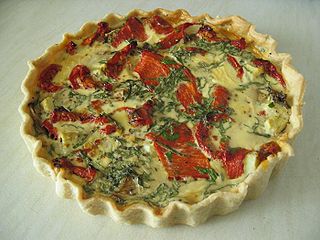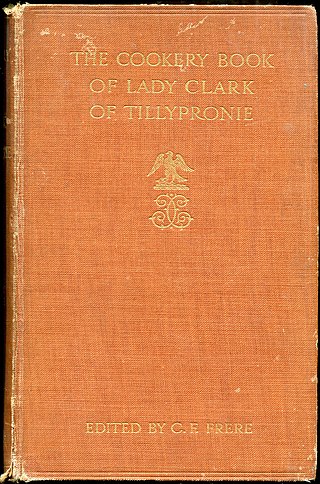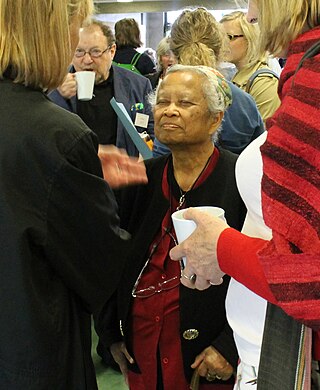 | |
| Author | Elizabeth David |
|---|---|
| Genre | Cookery |
| Publisher | Michael Joseph |
Publication date | 1960 |
| Media type | Hardback book |
French Provincial Cooking is a 1960 cookery book by Elizabeth David. It was first published in London by Michael Joseph.
 | |
| Author | Elizabeth David |
|---|---|
| Genre | Cookery |
| Publisher | Michael Joseph |
Publication date | 1960 |
| Media type | Hardback book |
French Provincial Cooking is a 1960 cookery book by Elizabeth David. It was first published in London by Michael Joseph.
Elizabeth David (1913–1992) was a British cookery writer who spent some years living in France [1] and other Mediterranean countries. In the mid-20th century she strongly influenced the revitalisation of home cookery in her native country and beyond with articles and books about European cuisines and traditional British dishes. [2]
French Provincial Cooking was published by Michael Joseph in London in 1960. [3] The first print run sold out and the book had to be reprinted within weeks of publication. [4] The first paperback issue of the first edition was by Penguin Books in 1964. The hardback sold for one pound fifteen shillings (£1.75 in decimal terms); [5] the paperback cost seven shillings and sixpence (35½p). [6]
New editions were published in 1965, 1967 and 1970. [7] Between the editions there were reprints with minor revisions. In addition to her original five-page introduction, David wrote prefatory notes to 1977 [8] and 1983 reissues. [9]
The book deals with the following topics:
After the success of her first book, the 1950 A Book of Mediterranean Food , based on her stays in Antibes and elsewhere during the Second World War, [11] David wrote four others on Mediterranean cuisines, namely the 1951 French Country Cooking, the 1954 Italian Food, the 1955 Summer Cooking, and finally in 1960 French Provincial Cooking. [12] David states that French Provincial Cooking incorporated numerous articles she had written for Vogue and The Sunday Times in the 1950s. [13] It has been described as "her most influential book", offering in Joe Moran's words a "stylish but straightforward cuisine [which] fitted in with a new type of casual urban entertaining", suitable for having "a few friends round for a meal" as opposed to an old-fashioned dinner party. [14]
In 1953, the American Cordon Bleu cook Julia Child visited Marseille and was like David impressed by the freshness of the produce from vegetables to fish, so unlike America's chilled and wrapped supermarket goods. This led to her 1961 book Mastering the Art of French Cooking . The culinary historian Rosemary Lancaster writes that while Child's book describes how to prepare the food plainly and directly, without David's discourses on the ambience of the cuisine, both women "seduced their readers", changing cooking habits in their home countries. [11]
In 1972, J. A. E. Loubère recommended the book to Americans for its combination of the pleasures of "armchair traveling" and "armchair cookery", noting that the provinces covered extend beyond the familiar ones, and that where some cuts of meat would not be readily available in the US, the recipes can easily be adjusted. [15] The book had success in Australia, too. The Australian novelist Marion Halligan wrote that David "gave meaning to the food" [16] at newly-fashionable post-war dinner parties that offered French food. [17]

James Andrews Beard was an American chef, cookbook author, teacher and television personality. He pioneered television cooking shows, taught at The James Beard Cooking School in New York City and Seaside, Oregon, and lectured widely. He emphasized American cooking, prepared with fresh, wholesome, American ingredients, to a country just becoming aware of its own culinary heritage. Beard taught and mentored generations of professional chefs and food enthusiasts. He published more than twenty books, and his memory is honored by his foundation's annual James Beard Awards.

English cuisine encompasses the cooking styles, traditions and recipes associated with England. It has distinctive attributes of its own, but is also very similar to wider British cuisine, partly historically and partly due to the import of ingredients and ideas from the Americas, China, and India during the time of the British Empire and as a result of post-war immigration.
An hors d'oeuvre, appetiser or starter is a small dish served before a meal in European cuisine. Some hors d'oeuvres are served cold, others hot. Hors d'oeuvres may be served at the dinner table as a part of the meal, or they may be served before seating, such as at a reception or cocktail party. Formerly, hors d'oeuvres were also served between courses. There are two types of hors d'oeuvre from service point of view:

Quiche is a French tart consisting of pastry crust filled with savoury custard and pieces of cheese, meat, seafood or vegetables. A well-known variant is quiche Lorraine, which includes lardons or bacon. Quiche may be served hot, warm or cold.

A cookbook or cookery book is a kitchen reference containing recipes.
An entrée, in modern French table service and that of much of the English-speaking world, is a dish served before the main course of a meal. Outside North America, it is generally synonymous with the terms hors d'oeuvre, appetizer, or starter. It may be the first dish served, or it may follow a soup or other small dish or dishes.

Elizabeth David CBE was a British cookery writer. In the mid-20th century she strongly influenced the revitalisation of home cookery in her native country and beyond with articles and books about European cuisines and traditional British dishes.

Jane Grigson was an English cookery writer. In the latter part of the 20th century she was the author of the food column for The Observer and wrote numerous books about European cuisines and traditional British dishes. Her work proved influential in promoting British food.

Mediterranean cuisine is the food and methods of preparation used by the people of the Mediterranean Basin. The idea of a Mediterranean cuisine originates with the cookery writer Elizabeth David's book, A Book of Mediterranean Food (1950) and was amplified by other writers working in English.

Lebanese cuisine is the culinary traditions and practices originating from Lebanon. It includes an abundance of whole grains, fruits, vegetables, fresh fish and seafood. Poultry is eaten more often than red meat, and when red meat is eaten, it is usually lamb and goat meat. Dishes include copious amounts of garlic and olive oil, and dishes are often seasoned with lemon juice. Chickpeas and parsley are also staples of the Lebanese diet.

Xavier Marcel Boulestin was a French chef, restaurateur, and the author of cookery books that popularised French cuisine in the English-speaking world.

Elizabeth Josephine Craig, MBE, FRSA was a Scottish journalist, home economist and a notable author on cookery.
Elizabeth David, the British cookery writer, published eight books in the 34 years between 1950 and 1984; the last was issued eight years before her death. After David's death, her literary executor, Jill Norman, supervised the publication of eight more books, drawing on David's unpublished manuscripts and research and on her published writings for books and magazines.

The Cookery Book of Lady Clark of Tillypronie is a book of recipes collected over a lifetime by Charlotte, Lady Clark of Tillypronie, and published posthumously in 1909. The earliest recipe was collected in 1841; the last in 1897. The book was edited by the artist Catherine Frances Frere, who had seen two other cookery books through to publication, at the request of Clark's husband.

A Book of Mediterranean Food was an influential cookery book written by Elizabeth David in 1950, her first, and published by John Lehmann. After years of rationing and wartime austerity, the book brought light and colour back to English cooking, with simple fresh ingredients, from David's experience of Mediterranean cooking while living in France, Italy and Greece. The book was illustrated by John Minton, and the chapters were introduced with quotations from famous writers.

Anchovy paste is a fish paste food product prepared using anchovies as a primary ingredient. It is used as a condiment and as an ingredient in various dishes, such as Scotch woodcock, and is a mass-produced product. It has been used for centuries to provide flavor to foods and as a source of nutrients, and it is a part of the cuisines of Great Britain, Italy, the Philippines and Vietnam. It is a major export product of Morocco.

Françoise Fillioux, known as "La Mère Fillioux" or "La Mère Filloux", was a French chef, proprietor of a famous restaurant in Lyon. Among her successors was Eugénie Brazier who worked in her kitchen as a young woman and continued her traditions of Lyonnaise cookery.

Sri Owen is an Indonesian cooking teacher and food writer, based in London for most of her life. She is the author of the first English-language recipe book dedicated to the food of Indonesia, and is recognised as a leading authority on Indonesian cuisine.